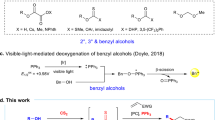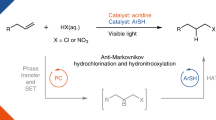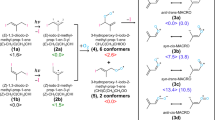Abstract
ALDEHYDES and ketones decompose in the gas phase in two main ways1. Type I, predominant with short chain compounds, may be represented RCOR' → CO + (RR + RR' + R'R'). Type II, predominant with long-chain compounds, involves a cracking of the long hydrocarbon chain in a position α–β to the carbonyl group, giving a lower carbonyl compound and an olefine.
This is a preview of subscription content, access via your institution
Access options
Subscribe to this journal
Receive 51 print issues and online access
$199.00 per year
only $3.90 per issue
Buy this article
- Purchase on Springer Link
- Instant access to full article PDF
Prices may be subject to local taxes which are calculated during checkout
Similar content being viewed by others
References
Norrish and Appleyard, J. Chem. Soc., 874 (1934). Bamford and Norrish, J. Chem. Soc., 1504 (1935).
Norrish and Bamford, NATURE, 138, 1016 (1936).
Norrish and Kirkbride, J. Chem. Soc., 1518 (1932). Norrish, Trans. Farad. Soc., 30, 107 (1934); Acta Physica Chemica URSS, 3, 171 (1935).
Author information
Authors and Affiliations
Rights and permissions
About this article
Cite this article
NORRISH, R., BAMFORD, C. Photo-decomposition of Aldehydes and Ketones. Nature 140, 195–196 (1937). https://doi.org/10.1038/140195b0
Issue Date:
DOI: https://doi.org/10.1038/140195b0
This article is cited by
-
Deacylation-aided C–H alkylative annulation through C–C cleavage of unstrained ketones
Nature Catalysis (2021)
-
Competition between cyclization and unusual Norrish type I and type II nitro-acyl migration pathways in the photouncaging of 1-acyl-7-nitroindoline revealed by computations
Scientific Reports (2021)
-
In situ photografting during direct laser writing in thermoplastic microchannels
Scientific Reports (2021)
-
Photodegradable branched polyethylenes from carbon monoxide copolymerization under benign conditions
Nature Communications (2020)
-
Photoassisted degradation of trifluoromethyl benzoic acid isomers in aqueous media by Ga2O3 under UVC irradiation
Research on Chemical Intermediates (2019)
Comments
By submitting a comment you agree to abide by our Terms and Community Guidelines. If you find something abusive or that does not comply with our terms or guidelines please flag it as inappropriate.



